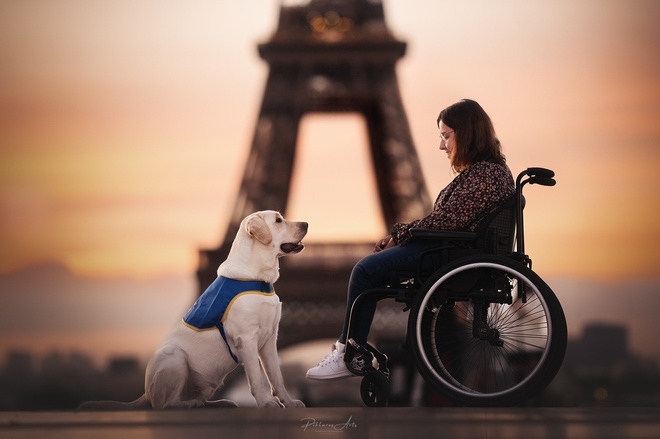On 3 December, for the International Day of Disabled Persons, Weenect is putting the spotlight on an extraordinary bond: the relationship between a person and their assistance dog. These dogs are real everyday heroes, making life easier for their beneficiaries while increasing their independence. Discover the moving story of Marie-Léa and her companion Shoko, an inseparable duo.

Reading time : 3 min
Founded in 1989, HANDI’CHIENS has trained and issued over 3,000 assistance dogs. These caring companions, mainly Labradors and Golden Retrievers, are trained to help people with a wide range of disabilities: motor impairment, autistic disorders, epilepsy and multiple disabilities.
The figures speak for themselves: in 2022, 122 dogs were handed over to their beneficiaries. Thanks to its 925 volunteers and five training centres, the association is offering a better future to many people.
Marie-Léa, 28 years old, has lived with a motor disability since birth. Her condition significantly impacts her daily life. "I can’t go out as I please. I have to find accessible and adapted places and plan ahead to avoid potential organizational issues," she explains. Even simple daily tasks, such as getting dressed or moving around her home, take extra time and energy.
But her life took a turn in 2023 when she received support from HANDI’CHIENS, an association that provides assistance dogs to people with disabilities free of charge.
For Marie-Léa, being paired with Shoko was an emotionally rich journey. "The application process is very thorough and lengthy," she says. The detailed form ensures the dog’s well-being and compatibility with the future handler’s lifestyle. After a year of waiting, Marie-Léa attended an intensive 15-day training program to learn the specific commands that Shoko had mastered during his 22 months of training.
The journey of these dogs is impressive: after spending 16 months with a foster family, they undergo six months of training at a HANDI’CHIENS center. The journey these dogs take is impressive: after 16 months in a foster home, they spend six months in a HANDI’CHIENS centre, where they receive specific training to meet the regulatory requirements for being able to access all public freely. Then their abilities are refined towards a ‘speciality’ (assistance dog, for people with epilepsy, etc.) depending on their skills or qualities.
Since Shoko entered her life, Marie-Léa has regained her confidence and independence. "He helps me open doors, take off my coat, pick up objects, and can alert my neighbors by barking three times if I have a problem." But Shoko’s assistance goes beyond practical tasks. "Before him, I hardly went out. His presence reassures me immensely. He has helped me reconnect with the outside world," she shares.
"He’s my best friend. Thanks to him, I’ve discovered new facets of myself, like patience. I’ve also become a volunteer for HANDI’CHIENS, which brings me immense fulfillment."
To make their daily life easier, Marie-Léa incorporated the Weenect tracker into Shoko’s routine. "It’s small and discreet. I can monitor his daily activity, which is essential for his well-being. The built-in flashlight reassures me during nighttime outings," she explains.
Despite the many benefits, challenges remain. Marie-Léa often s often refused access with her dog in public places, particularly in medical facilities. "I feel like people don’t respect me, my dog, or my disability," she laments.
She aims to raise public awareness: "If you see us, please don’t pet our dogs without permission. As assistance dogs, they need to stay focused on their tasks, which could be vital for us." She also hopes that assistance dogs will be better integrated into society. "I hope there will be more of them. They foster social bonds and brighten our lives."
Through the story of Marie-Léa and Shoko, Weenect reaffirms its commitment to supporting people with disabilities. We are proud to support HANDI’CHIENS and their life-changing work.
Find more information about the association and how to support them here.
Click on the buttons below to save this press release as a PDF or return to the Pressroom.